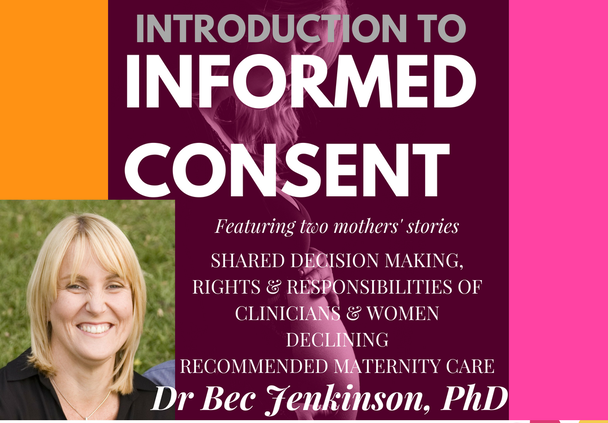Audience Reviews of A Close Look at Informed Consent
Informed decisions > Positive change
Part 1
Cindy shares her story of declining an induction. Dr Jenkinson then explains the legal position on the need for informed consent:
"For consent to be valid, it must be freely given, ie without coercion or inducement... and can't be trumped by hospital policy."
"For consent to be valid, it must be freely given, ie without coercion or inducement... and can't be trumped by hospital policy."
Part 2
Dr Jenkinson looks at how often clinicians' meet the legal standard for informed consent. In a Queensland study* from 2010, of the 3500+ women surveyed:
* Queensland Centre for Mothers and Babies: "Having a Baby in Queensland", 2010
- only 48% of women who had had a planned caesarean section were informed and had consented to have their procedure.
- 70% of women who had had epidural anaesthesia were informed and had consented to the procedure.
- 26% had not been informed or consented to their episiotomies.
* Queensland Centre for Mothers and Babies: "Having a Baby in Queensland", 2010
Part 3
Dr Jenkinson addresses here the underlying medico-legal and cultural concerns of clinicians (ie their individual "lines in the sand"), and gives TIPS for women on how to assess recommendations of care (at around 9 minutes in).
Part 4
Helen, shares her story of seeking a VBAC: "I wanted to make sure everything was OK for me and my baby... I just wanted to be heard". Helen received two very different responses to her wishes from two different hospitals.
Closing remarks given by Griffith University Professor Jennifer Fenwick and Sally Cusack from PBB Media.
References:
* www.patientopinion.org.au - to check for patients' opinions of hospitals around Australia
* http://www.choosingwisely.org.au/resources/consumers/5-questions-to-ask-your-doctor - questions to ask to prevent unnecessary treatments
* Standard 2: Partnering with Consumers - all hospitals must consult with their consumers in the design of their health services and for their individual care:
Closing remarks given by Griffith University Professor Jennifer Fenwick and Sally Cusack from PBB Media.
References:
* www.patientopinion.org.au - to check for patients' opinions of hospitals around Australia
* http://www.choosingwisely.org.au/resources/consumers/5-questions-to-ask-your-doctor - questions to ask to prevent unnecessary treatments
* Standard 2: Partnering with Consumers - all hospitals must consult with their consumers in the design of their health services and for their individual care:
Join the conversation!
After checking out the podcasts, continue the conversation and get support in giving/receiving respectful maternity care by joining our private Facebook group.
Why did we present this PBB Talk?
There are many reasons we want to present Dr Bec Jenkinson's information, but if we just look at health care outcomes - they are improved vastly when women are involved in the decisions for their care. In fact health consumer research conducted globally has found we are all more likely to survive our medical care when we are actively involved in the decisions. (This lead to the development of national safety and quality in health care Standard 2: Partnering with Consumers.)
We have access to world class maternity care in this country, yet we believe we could achieving better outcomes for our health dollar. For example, Australia has higher 3rd and 4th degree perineal tears, more caesarean sections and more stillbirths than the average for other OECD countries. Families in our maternity care system also experience high levels of perinatal anxiety and depression, and even PTSD as a result of birth trauma.
To help us get better outcomes from our health care Choosing Wisely Australia provides 5 tips for making your health care decisions and preventing unnecessary treatment. When we follow these steps our health services not also become safer, they also stand to save money, making them more sustainable. (Some health economists, such as Prof. Stefan Elbe, Univ Sussex, are watching the exponential rise in health care costs and are predicting the collapse of our health system by 2030.)
There is much more we can do! We can:
Enjoy "A Close Look at Informed Consent" with Dr Bec Jenkinson, and mothers Cindy and Helen. We thank you for being with us, and Bec, Cindy and Helen for helping us bring this vital information to light.
We have access to world class maternity care in this country, yet we believe we could achieving better outcomes for our health dollar. For example, Australia has higher 3rd and 4th degree perineal tears, more caesarean sections and more stillbirths than the average for other OECD countries. Families in our maternity care system also experience high levels of perinatal anxiety and depression, and even PTSD as a result of birth trauma.
To help us get better outcomes from our health care Choosing Wisely Australia provides 5 tips for making your health care decisions and preventing unnecessary treatment. When we follow these steps our health services not also become safer, they also stand to save money, making them more sustainable. (Some health economists, such as Prof. Stefan Elbe, Univ Sussex, are watching the exponential rise in health care costs and are predicting the collapse of our health system by 2030.)
There is much more we can do! We can:
- learn about our rights and obligations in maternity care (eg, by listening to this podcast series)
- seek continuity of care -mothers and babies are more likely to survive the perinatal period when they have the same carer not just through the pregnancy, but importantly during the birth and postnatal period.
- working in continuity models of care is also beneficial for clinicians as they get to build a detailed understanding of the women they attend. Studies have also shown it to lead to higher work satisfaction and lower stress levels.
- work with our local health service by having your say in its design. All Australian health services are required to engage with their local community for their accreditation, as per Standard 2: Partnering with Consumers. Check out your local health service's website and look for their community consultation links.
Enjoy "A Close Look at Informed Consent" with Dr Bec Jenkinson, and mothers Cindy and Helen. We thank you for being with us, and Bec, Cindy and Helen for helping us bring this vital information to light.
Want to support our ongoing work?
Consider becoming a PBB Media Patron...
Title page photo credit: Rachel Weber from Feather Touch Photography





